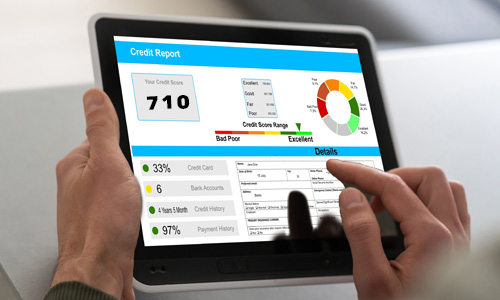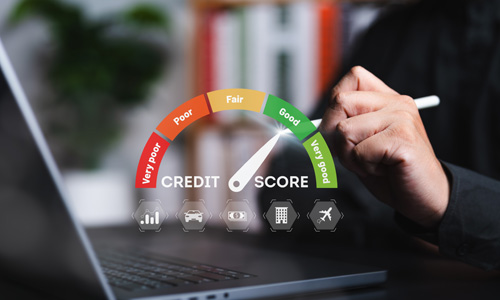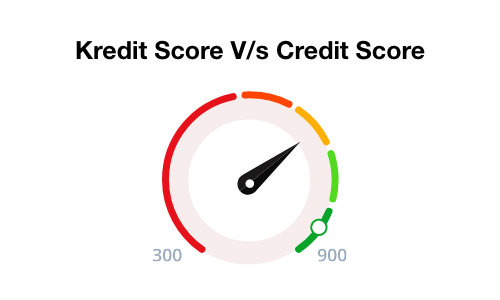5 Reasons Why Your Credit Score Isn’t Increasing
A credit score in UAE is one of the most crucial factors when it comes to borrowing. Lenders and creditors usually determine your creditworthiness based on this 3-digit numerical score. So, if your credit score is not going up, it might be frustrating.
However, logically, there might be various reasons why your credit score is stuck at the same place. For instance, you may have a high credit balance or a limited credit history, stopping your score from increasing.
If you are stuck in this realm and wondering - why isn’t my credit score going up? Consider reading on.
5 reasons behind your credit score not going up
Here are some reasons why your credit score is not improving –
You are utilising a substantial amount of available credit
Of all the factors, the most crucial one affecting your credit score is the credit utilisation ratio. It measures the difference between the amount of credit you use and the available credit limit in your account. Consider maintaining a low credit utilisation ratio of 30% as a general rule of thumb.
For example, if you have AED 10,000 as your available balance, try not to spend more than AED 3,000. In simple terms, if your credit balances are more than the range, your credit score might not go up.
A high credit utilisation ratio demonstrates that you are a credit-hungry borrower, which tarnishes your credit score.

You miss payments
Your record of making timely debt repayments is one of the primary factors affecting your credit score. So, if you are wondering – why is my credit score not updating? It might be because you have skipped a few payments.
However, the good news here is that late payments only get recorded in your credit report if they are 30 days past the due date. If you miss your debt payment by a week, you may have to pay the penalty, but it will not directly affect your score.
The bad news here is that missing a payment by more than 30 days can significantly hamper your score. It could take you years to rebuild your score back to normal after this.
You don’t have a credit mix
The variety of instalment accounts or your credit mix is another crucial factor affecting your score. An instalment debt is where you make fixed repayments at fixed intervals. Once you pay off the amount, your account is closed. Such types of accounts include mortgages, personal loans, student loans and more.
On the other hand, a credit card is a revolving account which requires a minimum monthly payment. This payment can fluctuate depending on your balance.
Ideally, you should try to maintain a healthy balance between instalment accounts and revolving accounts. This demonstrates to the creditor your ability to manage multiple types of credits. However, at the same time, refrain from obtaining too many debts at the same time, as this can negatively impact your score.
You have a limited credit history
Limited credit history could be another major reason why your credit score is not going up. A few factors that determine your credit history’s length include:
- Your accounts’ average age
- The age of your oldest account
- The time frame since you opened a new account
Typically, a longer history boosts your score, and a shorter history might bring your score down. So, how can you improve your credit history? The simple answer would be patience. You would have to wait until you bulk up the history. You can fasten this process by becoming an authorised user on a family member’s credit card. This will make you the beneficiary of the credit report of the cardholder. This way, you will be able to ramp up your credit history with time.

You have not reviewed your credit report
Sometimes, your credit report might have some issues or misinformation, which, if not reported, can lower your score. Thus, it is crucial to examine your credit report periodically to look out for any errors. Mistakes in any of the following forms may appear on your credit report:
- Closed accounts appearing as opened
- Incorrectly listed accounts
- Same debt featuring a double listing
- Inaccurate credit limits
The misinformation is not limited to the errors mentioned above. If you spot any such errors, it is your primary duty to inform the rating agency. Checking your history regularly will ensure that your score does not go down due to these mistakes. However, refrain from making too many enquiries, as this can, again, lower your score.
To sum up, another contributing factor behind your credit score not going up can be an already excellent score. Once your score is above 650, it will get difficult to increase it further. You can still increase it, but the progress will be much slower. While a variety of factors can affect your credit score, it is totally normal for it to fall occasionally. After determining the root issue, you can follow a few healthy habits to get your score back on track.
| Credit Score for different types of Loan | ||
|---|---|---|
| Credit Score for Personal Loan | Credit Score for House Loan | Credit Score for Car Loan |

More From Credit Score
- Recent Articles
- Popular Articles











